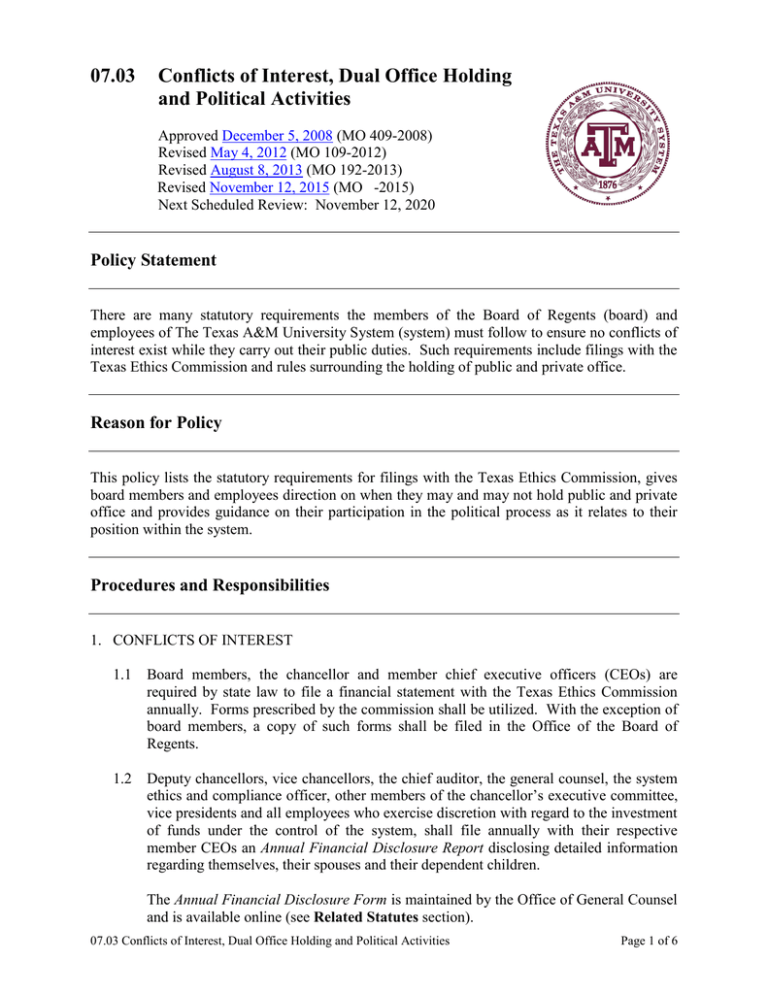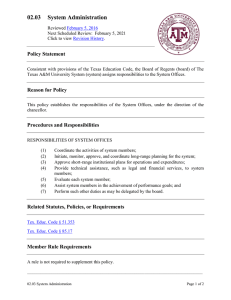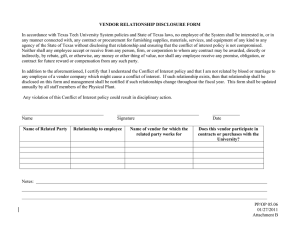07.03 Conflicts of Interest, Dual Office Holding and Political Activities
advertisement

07.03 Conflicts of Interest, Dual Office Holding and Political Activities Approved December 5, 2008 (MO 409-2008) Revised May 4, 2012 (MO 109-2012) Revised August 8, 2013 (MO 192-2013) Revised November 12, 2015 (MO -2015) Next Scheduled Review: November 12, 2020 Policy Statement There are many statutory requirements the members of the Board of Regents (board) and employees of The Texas A&M University System (system) must follow to ensure no conflicts of interest exist while they carry out their public duties. Such requirements include filings with the Texas Ethics Commission and rules surrounding the holding of public and private office. Reason for Policy This policy lists the statutory requirements for filings with the Texas Ethics Commission, gives board members and employees direction on when they may and may not hold public and private office and provides guidance on their participation in the political process as it relates to their position within the system. Procedures and Responsibilities 1. CONFLICTS OF INTEREST 1.1 Board members, the chancellor and member chief executive officers (CEOs) are required by state law to file a financial statement with the Texas Ethics Commission annually. Forms prescribed by the commission shall be utilized. With the exception of board members, a copy of such forms shall be filed in the Office of the Board of Regents. 1.2 Deputy chancellors, vice chancellors, the chief auditor, the general counsel, the system ethics and compliance officer, other members of the chancellor’s executive committee, vice presidents and all employees who exercise discretion with regard to the investment of funds under the control of the system, shall file annually with their respective member CEOs an Annual Financial Disclosure Report disclosing detailed information regarding themselves, their spouses and their dependent children. The Annual Financial Disclosure Form is maintained by the Office of General Counsel and is available online (see Related Statutes section). 07.03 Conflicts of Interest, Dual Office Holding and Political Activities Page 1 of 6 1.3 Any outside employment of the chancellor, including serving on the board of directors of a corporation, shall be approved in advance by the chairman of the board or the chairman's designee. 1.4 As state officers, board members, the chancellor, presidents and agency directors are required to disclose any legal or equitable interest in property that is to be acquired with public funds. Such disclosure shall be made by filing an affidavit containing specific information as required by Tex. Gov’t Code § 553.002. The affidavit must be filed with the county clerk of the county in which the individual resides and the county clerk of each county in which the property is located. Such filing must be completed within 10 days before the date on which the property is to be acquired by purchase or condemnation. 1.5 The system and its members are prohibited from entering into a contract for the purchase of goods or services under Tex. Educ. Code § 51.9335 with a private vendor with whom any of the following employees has a financial interest: (a) the chancellor or a member CEO, the system general counsel, or the system or a member chief procurement officer or procurement director; or (b) any person related to an employee described by Subsection 1.5(a), within the second degree of affinity (marriage) or consanguinity (blood). The employees listed in section 1.5(a) shall promptly disclose to the system general counsel and to their supervisor the existence of a financial interest with a private vendor that may prohibit the system or the respective system member from entering into a contract with the vendor. 1.5.1 Relatives within the second degree by affinity and consanguinity: (a) A person is related to an employee within the second degree of affinity if such person is an employee’s spouse, spouse’s child, spouse’s mother or father, spouse’s brother or sister, spouse’s grandparent, spouse’s grandchild, child’s spouse, parent’s spouse, brother or sister’s spouse, grandparent’s spouse or grandchild’s spouse; and (b) A person is related to an employee within the second degree of consanguinity if the person is an employee’s parent, child, brother, sister, grandchild or grandparent. (c) For purposes of this section, an adopted child is treated as the natural child of the adoptive parents. 1.5.2 An employee described by Subsection 1.5(a) or 1.5(b) has a financial interest in a private vendor if the employee: (a) owns or controls, directly or indirectly, an ownership interest of at least one percent in the private vendor, including the right to share in profits, proceeds, or capital gains; or 07.03 Conflicts of Interest, Dual Office Holding and Political Activities Page 2 of 6 (b) could reasonably foresee that a contract with the private vendor could result in a financial benefit to the employee. 1.5.3 A financial interest prohibited by this section does not include a retirement plan, a blind trust, insurance coverage, or an ownership interest of less than one percent in a corporation. 1.6 Employees are prohibited from having a direct or indirect financial or other interest, engaging in a business transaction or professional activity, or incurring any obligation that is in substantial conflict with the proper discharge of the employee’s official duties and responsibilities. 1.7 As soon as possible after becoming aware of any potential conflict of interest, a board member shall disclose such fact and any other relevant information to the general counsel. In such an event, the general counsel shall review the potential conflict and issue an opinion. 1.8 Any member employee who exercises discretion or makes decisions regarding the award of a bid or contract with a private vendor shall promptly disclose to the member CEO or designee on the Potential Conflict of Interest Disclosure Form any potential conflict of interest that is known by the employee with respect to any contract with a private vendor or bid for the purchase of goods or services from a private vendor by the member. A “potential conflict of interest” under this section means an interest, financial or otherwise, that could potentially conflict with the conscientious performance of an employee’s official duties and responsibilities, including interests that could create the appearance of impropriety. 1.9 System Policy 07.01, Ethics, provides additional guidance on conflicts of interests that board members and employees must avoid. 2. DUAL OFFICE HOLDING 2.1 Non-elective State or Federal Office 2.1.1 Board members and employees may hold non-elective offices with boards, commissions and other state and federal entities provided that the holding of such office (a) is of benefit to the state of Texas or is required by state or federal law, and (b) is not in conflict with the board member’s or employee's position within the system. In the case of employees, such appointments must be approved by the member CEO. 2.1.2 Prior to the chancellor or a member CEO accepting an invitation to serve in an additional non-elective office, the board must determine that the appointment meets the two requirements stated above. The board must also make an official record of any compensation to be received by the chancellor or member CEO from such appointment, including salary, bonus, per diem or other types of compensation. 2.2 Employees may hold other positions of employment with agencies, boards, commissions or other entities of government as long as the holding of such positions is 07.03 Conflicts of Interest, Dual Office Holding and Political Activities Page 3 of 6 consistent with the prohibitions against dual office holding in the Texas Constitution. Consulting arrangements with federal, state or local governmental agencies of a detached and independent advisory nature are not considered to be appointments with such agencies. 3. POLITICAL ACTIVITIES 3.1 Restrictions on Members, Board Members and Employees 3.1.1 A member may not use any money under its control, including appropriated money, to finance or otherwise support the candidacy of a person for an office in the legislative, executive or judicial branch of state government or of the government of the United States. This prohibition extends to the direct or indirect employment of a person to perform an action described by this subsection. 3.1.2 A board member or employee may not use a state-owned or leased vehicle for a purpose described by Subsection 3.1.1. 3.1.3 A member may not use appropriated money to attempt to influence the passage or defeat of a legislative measure. This subsection does not prohibit a board member or employee from using state resources to provide public information or to provide information responsive to a request. 3.1.4 Board members and employees shall not use their official authority or influence, or permit the use of a program administered by the system to interfere with or affect the result of an election or nomination of a candidate or to achieve any other political purpose. 3.1.5 Board members and employees shall not coerce, attempt to coerce, command, restrict, attempt to restrict or prevent the payment, loan or contribution of anything of value to a person or political organization for a political purpose. 3.1.6 An employee who violates Subsections 3.1.4 or 3.1.5 is subject to immediate termination of employment. A member may not use appropriated money to compensate a board member or employee who violates any of the previous subsections of this section. 3.2 As employees and public officers of the state of Texas, board members and employees have the rights of freedom of association and political participation guaranteed by the state and federal constitutions, except as provided by Section 3.1. Board members and employees shall be allowed sufficient time off to vote in public elections without a deduction from pay or from accrued leave time. 3.3 Employees as Candidates and Officeholders 3.3.1 Employees may run for election and serve as members of the governing bodies of school districts, cities, towns or other local governmental districts. A county is not an “other local governmental district” for purposes of this section. No campaign activities may be conducted during official business hours unless the 07.03 Conflicts of Interest, Dual Office Holding and Political Activities Page 4 of 6 employee has requested and received permission to use leave time for such purpose. Any employee elected to such a position may not receive any salary for serving as a member of such governing bodies, except that a faculty member of system academic institutions may receive compensation for serving as a member of a water district created under Article XVI, Section 59 or Article III, Section 52 of the state constitution. 3.3.2 If an employee wishes to announce as a candidate and seek election to a county, state, or federal office, such employee may not conduct campaign activities during official business hours unless the employee has requested and received permission to use leave time for such purpose. The employee shall not use any system resource for campaign purposes. 3.3.3 A member is authorized to adopt a procedure requiring an employee to resign from system employment before announcing as a candidate and seeking election to any office that would, in the judgment of the member, create a potential or actual conflict of interest with the individual’s current position of employment. Prior to adoption, this procedure shall be submitted to the Office of General Counsel for legal sufficiency review. Two examples of such conflicts of interest include: (a) an office that funds any portion of the salary of the employee’s position of system employment; or (b) an office that would give the employee supervisory authority over his or her supervisor (or a higher-ranking member employee in the individual’s “chain of command”). This subsection is based on the system’s important interest in the integrity of its institutions and agencies and in the integrity, efficiency, loyalty and nonpartisanship of its employees. 3.3.4 Federal law may prohibit an employee whose salary is paid completely by federal funds from becoming a candidate for elective office. An employee should contact their member human resources office if the employee has questions about the application of this prohibition. 3.4 Board members and employees may make personal contributions to candidates for office and political organizations with the exception that employees may not contribute personal services, money or goods of value to a speaker candidate for use in the campaign for speaker of the Texas House of Representatives. Related Statutes, Policies, or Requirements Annual Financial Disclosure Form Potential Conflict of Interest Disclosure Form 5 United States Code § 1502(a)(3) Texas Constitution, Art. XVI, § 40 Tex. Gov’t Code Ch. 302, Speaker of the House of Representatives 07.03 Conflicts of Interest, Dual Office Holding and Political Activities Page 5 of 6 Tex. Gov’t Code Ch. 553, Public Disclosure Tex. Gov’t Code Ch. 556, Political Activities by Certain Public Entities and Individuals Tex. Gov’t Code Ch. 572, Personal Financial Disclosure, Standards of Conduct, and Conflict of Interest Tex. Gov’t Code Ch. 574, Dual Office Holding Texas Government Code § 2261.252 System Policy 07.01, Ethics System Policy 07.04, Benefits, Gifts and Honoraria System Policy 31.01, Compensation System Regulation 07.03.01, Political Campaign Events on Property Under the Control of The Texas A&M University System System Policy 31.05, External Employment and Expert Witness System Policy 33.03, Nepotism Definitions Public funds – includes only funds collected by or through a government. System resource – an item or tool provided by the system for purposes of satisfying normal business activities, including but not limited to internet access, e-mail addresses, facsimiles, telephone and personal computing services, procurement and credit cards, and all other organizational assets, including cash. Member Rule Requirements A rule is not required to supplement this policy. Contact Office Office of General Counsel (979) 458-6120 07.03 Conflicts of Interest, Dual Office Holding and Political Activities Page 6 of 6


